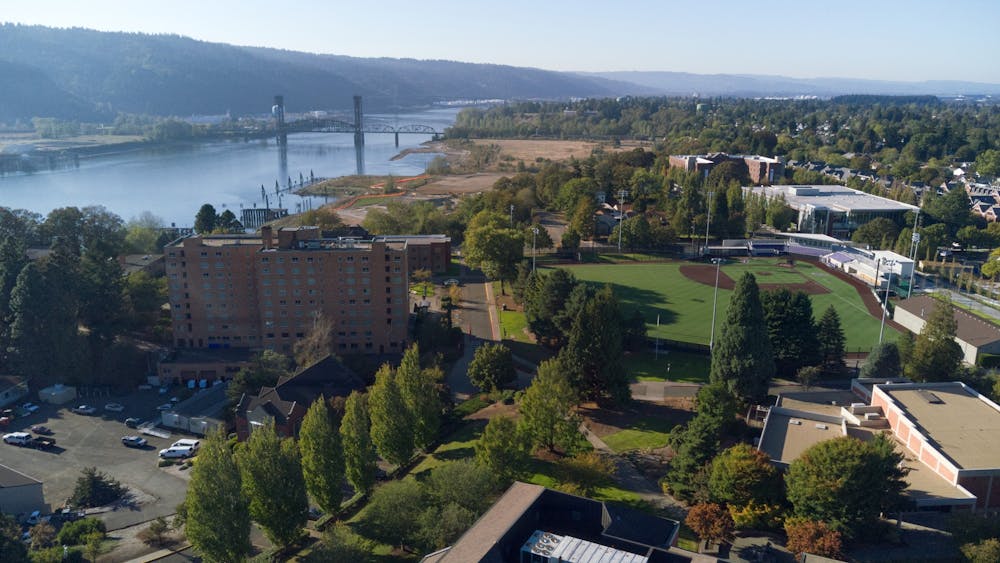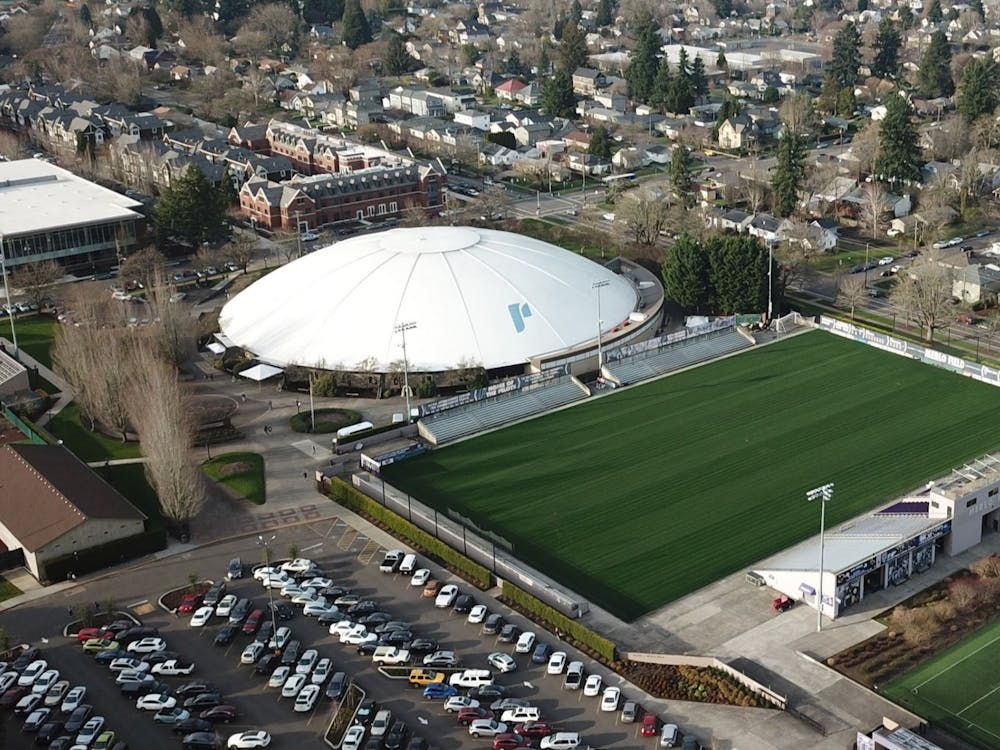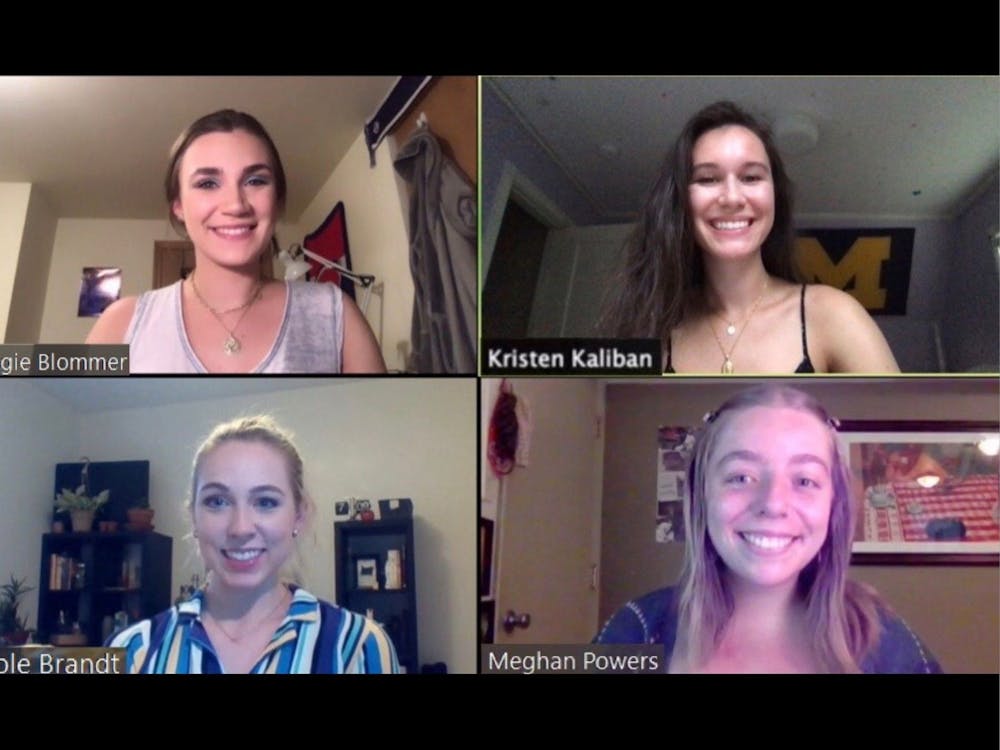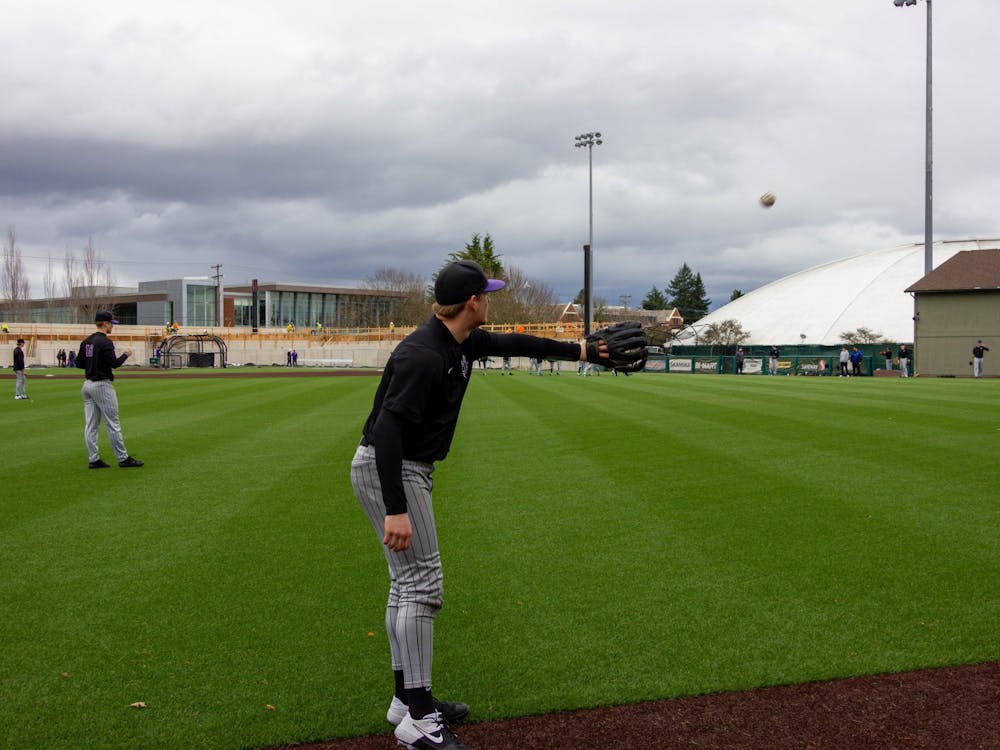The last thing Raphaelle LeBlanc expected to happen when she DM’d Megan Rapinoe last summer inviting her to a Pilot’s Talk was a response.
“I was really nervous,” LeBlanc said. “I was kind of like ‘okay, well I'm just gonna shoot my shot and see what happens,’ worst case, she'll say no, and that's fine. At least I tried.”
To her surprise, Rapinoe not only responded, but said yes.
I wasn't expecting that, so I was kind of like, ‘oh my god, I guess I'll see you on Pilots Talk,’” LeBlanc said.
LeBlanc, a women’s tennis player, is the Vice President of the Student Athlete Advisory Committee (SAAC). SAAC functions as the liaison between student-athletes, their teams and the athletic department.
If you haven’t heard of SAAC before, you aren’t alone. Until this year, SAAC was less interactive and visible on campus. LeBlanc said that when she ran for vice president, she wasn’t clear about what SAAC was or what they did.
This year, SAAC’s leadership has expanded its general goal of acting as a go-between to include developing camaraderie between different sports teams and ingratiating student-athletes into the broader UP community.
In pursuit of these goals, SAAC has created Pilots Talk and the Pilots Vote initiative, has worked to acculturate student-athletes with the broader UP community and is requiring each subcommittee to host one of their three events this semester on the topic of Diversity, Equity, and Inclusion (DEI).
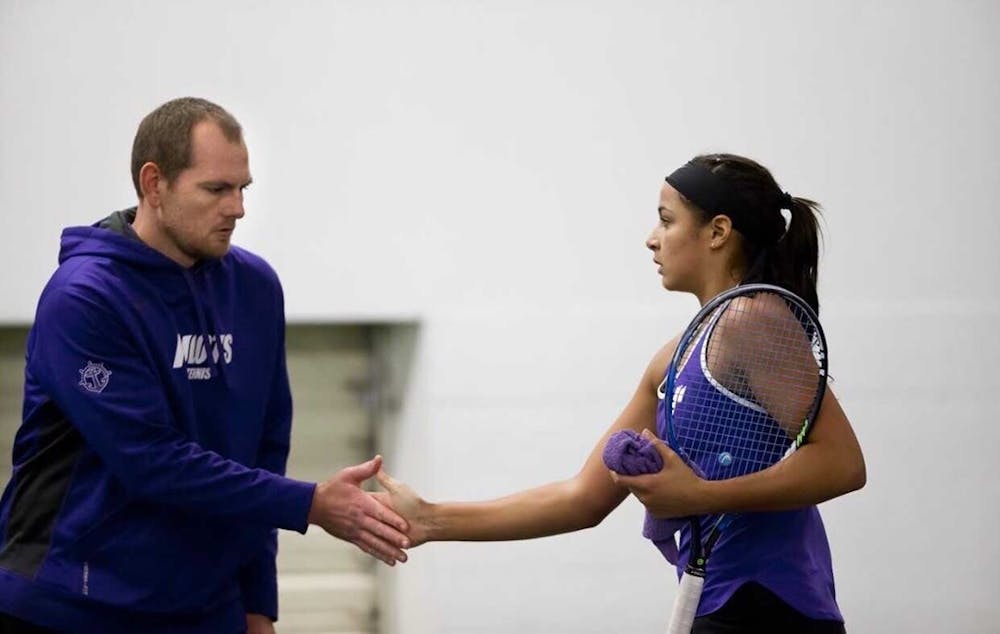
Raphaelle LaBlanc receives praise during a freshman year game from coach Filip.
Pilots Talk serves as a safe-space for student-athletes to discuss prominent issues in athletics and society as well as a way to foster community and develop camaraderie amongst student-athletes in different sports. Some Pilots Talks have also been a way to build relationships with organizations outside the student-athlete bubble.
A typical Pilots Talk is highly interactive and ensures every member is comfortable and able to weigh in on the topic at hand. After a topic is introduced, members can break off to discuss it in more detail.
“From there the conversation really opens up,” LeBlanc said. “If we see that it's going somewhere, we'll keep talking about it, but if not, we'll ask another question. But usually, the conversation really flows, everyone brings out super great points and then we go in another direction.”
Generally, only current student-athletes may attend, however, SAAC occasionally invites guests on, like Rapinoe or UP men’s basketball head coach Terry Porter, or an on campus organization like the Black Student Union (BSU) or the Associated Students of the University of Portland (ASUP).
It was critical to SAAC that the format stays consistent regardless of who was attending. LeBlanc said that her favorite thing about having Rapinoe on was like she was another student-athlete.
“The greatest thing about the Pilots Talk when (Rapinoe) came was that it didn't turn it into a Megan Rapinoe Q&A,” LeBlanc said. “We kept the same format, and it was as if she was a student-athlete, at UP in 2020 and just participating at a Pilot's Talk.”
Another purpose of Pilots Talk is to develop relationships with other organizations on campus, as historically, there hasn’t been a lot of overlap between student-athletes and the general student body.
BSU president Sharif Morton said that it has felt to him like there were two different groups of Black students at UP: the Black student-athletes and the Black students in the general population.
“It seemed like those two groups were mutually exclusive,” Morton said. “The athletes had their own clique, they all ate together, they traveled together, they played together and spent most of their days and nights together. For the rest of the African American students on campus, it was like a free for all, like ‘not sure if this person is cool or not, but they look like me, so I guess we're gonna talk.’”
Morton said that his desire to collaborate with student-athletes stemmed from when he was able to get to know some of the athletes on the UP basketball teams when he went, as a part of the UP pep band, to Las Vegas for the WCC basketball tournament in 2019.
“(On the trip) I got to meet a couple of the athletes and I was like ‘Wow, so you guys felt that we were excluding you from our community, but we always thought that you guys were excluding us from your community,’” Morton said. “It was a sort of mutual attraction that neither group had realized.”
SAAC had BSU on a Pilots Talk about white savior complex earlier this semester. LeBlanc said that it was the best one so far and she hopes to have BSU on again.
SAAC also hosted a special Pilots Talk earlier this semester with political science professor and faculty-athletic representative, Gary Malecha, along with athletic faculty and staff and ASUP, to discuss the importance of voting.
In addition to collaborating with BSU and ASUP, SAAC is working to encourage student athletes within the broader UP community to get involved in clubs and ASUP and step outside the bubble of athletics.
This year, Nevaeh Bray, a freshman on the women’s volleyball team, was elected ASUP Freshman class senator and LeBlanc ran for ASUP Vice President.
SAAC has partnered with the athletic department to create the Pilots Vote initiative, which gives all student-athletes Nov. 3, the day of the 2020 general election, off from athletic activity, said SAAC president and cross country and track and field athlete, Sofia Castiglioni.
“(SAAC is) really trying to just educate student-athletes... (on) how important it is to vote and to be a functioning member of this democracy in order to have it work for everyone,” Castiglioni said. “We're not trying to push anyone to vote a certain way, but just to make sure that people know how to register to vote, and that they make their voices heard.”
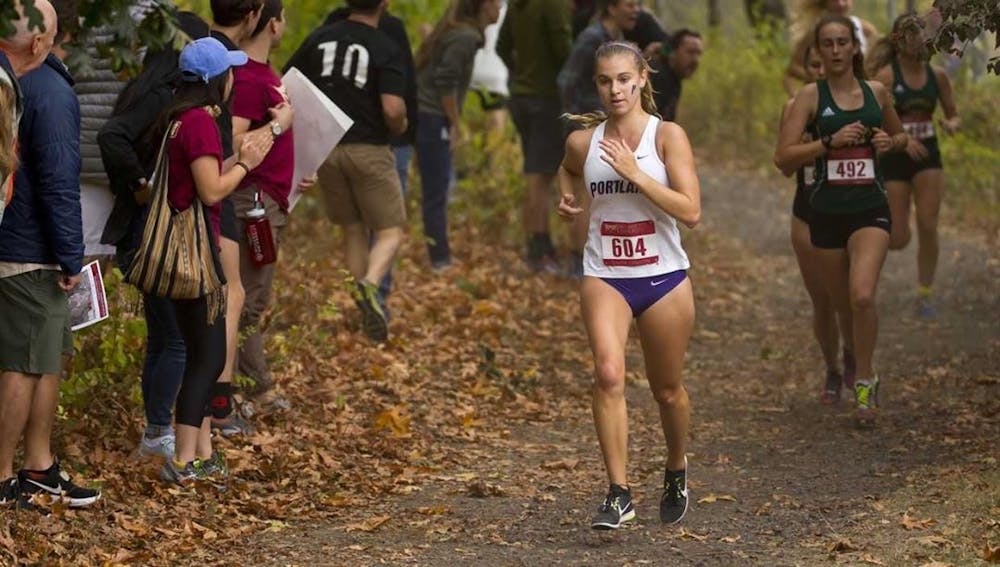
Sofia Castiglioni number 604 runs a cross country race to the finish line.
Through the Pilots Vote initiative, according to LeBlanc, every team is registered to vote. She attributes the positive response of student-athletes to the Pilots Vote initiative to their competitive nature.
“As athletes, we really like competition and challenges,” LeBlanc said. “So that was kind of our key points, how can we make this competitive so people are like, ‘Oh my god I got to register now.’ And I think that's one of the reasons why we have such a high rate of registration.”
SAAC has also been working with the UP athletic department to create a DEI committee within the athletic department, in order to serve as a space to voice and discuss problems and improvements within UP athletics and as an oversight measure to make sure UP athletics follows through on their goals.
The committee is chaired by Senior Associate Athletic Director Karen Peters and Assistant Athletic Director Jose Nevarez and consists of eleven other members ranging from students to coaches to alums.
Peters believes that the DEI committee is critical for the athletic department because it allows them to hear directly from all sectors of athletics.
“As administrators, we can't be foolish enough to think we have all the answers,” Peters said. “We also can't know exactly what our students are going through in any instance, especially this one. So, how do we make sure that we're listening to our students that we're doing our very best to understand what their experience is like, and how we can make it better?”
The committee’s primary focus right now is on improving the athletic department systemically and culturally and how they can better educate coaches and staff with the experiences of Black, Indigenous, and People of Color (BIPOC) student-athletes and coaches in mind.
Castiglioni said that she was impressed by the lengths the athletic department took to listen to the student-athlete voice and incorporate them into the decision-making process.
“What I was impressed by was how much they valued the student-athlete representative voice,” Castiglioni said. “The administrators were constantly asking us questions like ‘do you think we're doing a good job here,’ ‘how do you think we can bring more diversity into our programs, especially since a lot of WCC schools are predominantly white institutions,’ and so they were... asking for all of our support.”
The committee’s primary focus thus far has been the Pilots Vote initiative, however, they are also looking into partnering with BIPOC owned businesses in North Portland and making both campus and athletics a safe space for BIPOC students.
They have also been working with Caua Sores, a player on the UP men’s soccer team, and Eduardo Contreras, Assistant Provost for International Education, Diversity and Inclusion, who are two of the five members on the WCC DEI committee, to intertwine campus initiatives and WCC initiatives.
Because athletics is one of the most diverse groups on campus, Peters is constantly thinking about how the strides made by the committee can be implemented campus-wide.
“We are the melting pot of campus,” Peters said. “We are a very diverse group of students, coaches and staff, and so I think it's a place where we see that we can help be leaders on campus.”
This sentiment is also something SAAC’s leadership has thought a lot about. LeBlanc believes that athletes have a responsibility and duty to speak up against injustices they witness in society.
“We have a lot of power and are privileged (as athletes),” LeBlanc said. “It wouldn't be fair of us to just sit here and watch and not do anything.”
William Seekamp is the Sports Editor for The Beacon. He can be reached at seekamp22@up.edu.



